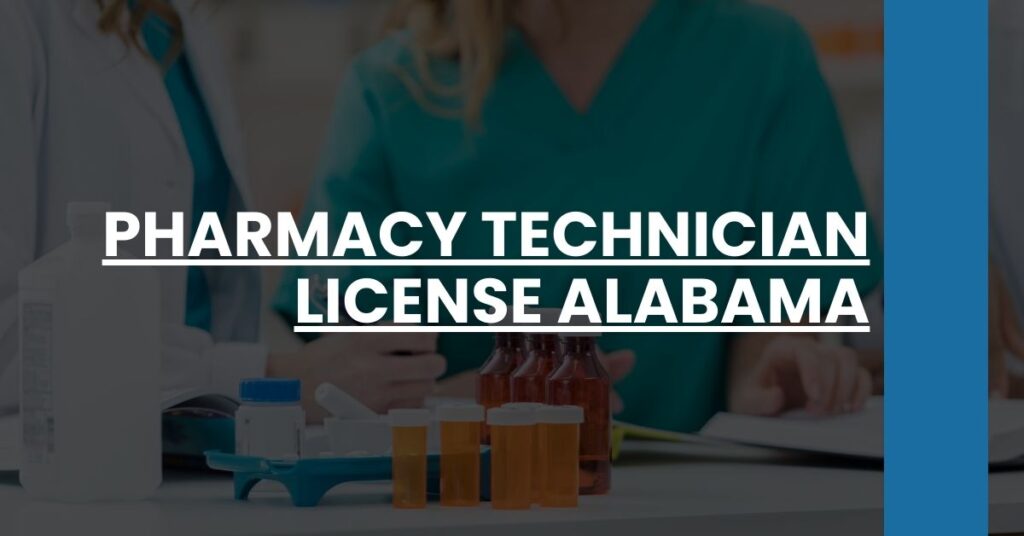Looking for programs in a specific city? Check out our lists of Pharmacy Technician Programs in Huntsville, Birmingham, Montgomery, Mobile, and Tuscaloosa
Becoming a pharmacy technician in Alabama opens up a world of opportunities. If you’re looking into obtaining a Pharmacy Technician License Alabama, you’ve probably noticed that understanding all the requirements and steps can be overwhelming. Rest assured, you’re not alone in feeling this way.
To make your journey easier, our team has compiled a detailed guide to help you every step of the way. Here’s what you’ll learn:
- The basic requirements for a Pharmacy Technician License in Alabama.
- How to complete the necessary education and training.
- Detailed steps to apply for your license and ensure you meet all regulatory standards.
- What Are the Basic Requirements for a Pharmacy Technician License in Alabama?
- How to Complete the Required Education and Training
- Steps to Apply for a Pharmacy Technician License in Alabama
- PTCB Certification: Is It Necessary for Alabama?
- Background Check and Fingerprinting Process for Alabama Pharmacy Technicians
- Continuing Education Requirements for Pharmacy Technicians in Alabama
- Job Outlook and Career Opportunities for Pharmacy Technicians in Alabama
- Typical Salary and Benefits for Pharmacy Technicians in Alabama
- Resources and Support Networks for Alabama Pharmacy Technicians
- Tips for Aspiring Pharmacy Technicians in Alabama
- Find Pharmacy Technician Programs Near You
- Online Pharmacy Technician Programs
- Looking for Pharmacy Technician Information On States Bordering Alabama?
- Best Pharmacy Technician Schools
What Are the Basic Requirements for a Pharmacy Technician License in Alabama?
If you aim to become a pharmacy technician in Alabama, you’ll need to meet certain fundamental criteria. This ensures you are prepared for the responsibilities that the role entails. Here are the basics you should know.
Age and Education Requirements
To qualify for a pharmacy technician license in Alabama, you must be at least 17 years old. Additionally, you must have completed your high school education or obtained a GED. These educational requirements ensure that you have the foundational knowledge necessary for the role.
Criminal Background Check
Your background will be scrutinized as part of the licensing process. This includes a thorough criminal background check. The aim is to ensure public safety and maintain the integrity of the pharmacy profession.
Training Program
Upon registration, you have six months to complete a board-approved training program. This program is integral for understanding the technical and legal aspects of the job. You must keep documentation of this training for two years, so it’s vital to maintain your records meticulously.
How to Complete the Required Education and Training
The journey to becoming a skilled pharmacy technician involves acquiring the right education and training. Here’s what you need to know:
Education Programs
Many institutions offer education programs for aspiring pharmacy technicians. These programs are available at community colleges, vocational schools, and even online. They cover essential subjects like:
- Pharmacology: Understanding drugs, their uses, and effects.
- Medical Terminology: Grasping the medical language used in prescriptions and documentation.
- Pharmacy Law: Familiarizing yourself with state and federal laws that govern pharmacy practice.
Training Opportunities
Making the most of training opportunities is crucial. Alabama Board of Pharmacy approves various programs, both online and in-person. Typically, these programs offer hands-on experiences through internships and labs, making you well-rounded in practical skills.
Certification
Obtaining a certification, while not mandatory, is highly beneficial. One recognized certification is the Pharmacy Technician Certification Exam (PTCE) offered by the Pharmacy Technician Certification Board (PTCB). It’s a way to validate your expertise and increase employability. To get a sense of what the exam entails, you can check out PTCB practice tests.
Steps to Apply for a Pharmacy Technician License in Alabama
Navigating the application process can seem daunting, but breaking it down into manageable steps makes it easier.
Application Process
Here’s a step-by-step guide to applying for your license:
- Submit a Notarized Application: Obtain the application form from the Alabama Board of Pharmacy website. Fill it out and get it notarized.
- Pay the Application Fee: The fee is $60. Be prepared to cover any additional costs such as the background check fee.
- Certification Requirement: If more than three pharmacy technicians are employed per pharmacist, at least one must be certified by PTCB.
Required Documentation
When applying, you’ll need to provide various documents:
- High School Diploma or GED: Proof of your completed high school education.
- Recent Photo: A clear, recent photograph for identification purposes.
- Training Proof: Evidence that you’ve completed a board-approved training program.
Fees
Different fees are involved in the application process:
- Application Fee: $60
- Background Check Fee: $40
- Processing Fee: $4
- Total: $104
By following this guide, you’ll ensure you meet all the necessary criteria and submit a complete application.
PTCB Certification: Is It Necessary for Alabama?
Given the array of certifications out there, you might wonder whether PTCB certification is necessary. Here’s what you should know:
Certification Requirements
In Alabama, PTCB certification is not mandatory. However, it is highly beneficial, particularly if more than three technicians are working under one pharmacist. This certification is an asset, making you a more desirable candidate for employers.
Benefits
Being PTCB-certified brings numerous advantages:
- Standardized Knowledge: Certification ensures you possess a standardized level of knowledge and skill.
- Career Opportunities: Certification can significantly enhance your career prospects and salary potential.
Steps to Achieve PTCB Certification
To become PTCB-certified, you must:
- Complete a Training Program: Enroll in a PTCB-approved training program or gain equivalent work experience.
- Pass the PTCE: Successfully passing the Pharmacy Technician Certification Exam is crucial.
For detailed guidance on certification, consider exploring resources like how to become a pharmacy technician.
Background Check and Fingerprinting Process for Alabama Pharmacy Technicians
A pivotal part of becoming a pharmacy technician in Alabama is the fingerprinting and background check.
Fingerprinting
Post-application, you’ll need to undergo fingerprinting. The Board of Pharmacy will provide specific instructions on where and how to get your fingerprints taken.
Background Check
The background check is comprehensive and designed to ensure there are no criminal records that could compromise your role. The total cost for this process is $40.
By ensuring transparency and accountability through background checks, the Board aims to maintain high industry standards.
Continuing Education Requirements for Pharmacy Technicians in Alabama
Once licensed, maintaining your credentials involves meeting continuing education (CE) requirements.
Annual CE Requirements
Technicians in Alabama must complete 3 hours of continuing education annually. At least 1 of these hours must be a “live” credit. Courses accepted for CE credit are often those accredited by the Accreditation Council for Pharmacy Education (ACPE).
NABP Reporting
Reporting your CE credits is straightforward through the National Association of Boards of Pharmacy (NABP):
- Login to NABP e-Profile: Create an account or log in.
- Enter Course Details: Submit information on the courses you’ve completed.
- Track Your Status: Monitor your CE credits to ensure compliance.
By adhering to CE requirements, you stay updated on the latest practices and maintain your license in good standing.
Job Outlook and Career Opportunities for Pharmacy Technicians in Alabama
Employment Growth
You will find that the job market for pharmacy technicians in Alabama is expanding. Between now and 2028, the number of available positions is projected to grow by approximately 10.96%. This translates to over 580 new jobs yearly. As healthcare demands rise, so does the need for qualified pharmacy technicians.
Career Pathways
Once you become a licensed pharmacy technician, numerous career paths open up for you:
- Lead Technicians: You can advance to supervisory roles where you manage other technicians and oversee workflow.
- Specialized Technicians: Roles such as IV pharmacy or chemotherapy technicians allow you to specialize in areas that align with specific health needs.
- Pharmacy Management: Experienced technicians can move into pharmacy management positions, overseeing the entire operations of a pharmacy.
Major Employers
You’ll find various venues to apply your skills, including:
- Retail Pharmacies: Chains like Walgreens and CVS Health are major employers.
- Hospitals and Clinics: Facilities such as Mobile Infirmary Medical Center often require skilled technicians.
- Pharmacy Services: Independent and online pharmacies also provide significant employment opportunities.
Typical Salary and Benefits for Pharmacy Technicians in Alabama
Salary Statistics
Understanding your potential earnings helps you plan your career effectively. In Alabama, the average salary for a Pharmacy Technician I is $36,384 annually. However, it typically ranges from $32,811 to $40,593, depending on factors like location, experience, and additional certifications.
Benefits
Aside from a competitive salary, you can expect a range of benefits:
- Medical Insurance: Comprehensive health coverage is often included.
- Dental and Vision Insurance: Many employers offer plans to cover dental and vision care.
- 401(k) Plans: Retirement savings plans with employer contributions.
- Paid Time Off: Including vacation days, sick leave, and sometimes even paid holidays.
- Discount Programs: Benefits may include discount programs for prescription medications and other items.
Resources and Support Networks for Alabama Pharmacy Technicians
Professional Organizations
Engaging with professional bodies can be highly beneficial. The Alabama Pharmacy Association is a valuable resource. They offer various benefits including continuing education opportunities, networking events, and updates on industry standards and practices.
Support Networks
Stay updated and connected with organizations like the Pharmacy Technician Certification Board (PTCB). They provide important resources and support, aiding in maintaining certification and fostering professional development.
Tips for Aspiring Pharmacy Technicians in Alabama
Certification
Even though PTCB certification is optional, obtaining it can give you a competitive edge in the job market. Employers often prefer certified technicians, which could lead to higher salaries and better job opportunities.
Continuing Education
Stay proactive by adhering to your continuing education requirements. This not only keeps you abreast of the latest industry trends and practices but also ensures that you meet all licensing renewal criteria.
Networking
Join professional organizations such as the Alabama Pharmacy Association. Networking can open doors to new job opportunities and career advancement. Connecting with seasoned professionals offers valuable insights and mentorship opportunities.
Find Pharmacy Technician Programs Near You
Looking for pharmacy technician programs close to home can be challenging, but it’s essential for hands-on training.
Check out pharmacy technician programs near me to find convenient options that suit your location and schedule.
Benefits of Local Programs:
- Accessibility: Reduces travel time and costs.
- Community Connections: Potential for local internships and job placements.
- Support Systems: Proximity to family and friends for added support.
Online Pharmacy Technician Programs
If you need a more flexible schedule, online programs could be the perfect solution. These programs offer the same rigor as in-person ones but come with added flexibility.
Benefits of Online Programs
- Flexibility: Study at your own pace and schedule.
- Accessibility: No need to commute, saving time and money.
- Diverse Courses: Access to a broader range of programs and specializations.
For more information, explore online pharmacy tech programs tailored to fit different learning preferences.
Looking for Pharmacy Technician Information On States Bordering Alabama?
In addition to Alabama, we suggest looking for programs in nearby states.
- Pharmacy Technician License Mississippi
- Pharmacy Technician License Tennessee
- Pharmacy Technician License Georgia
- Pharmacy Technician License Florida
- Pharmacy Technician License Louisiana
Best Pharmacy Technician Schools
Selecting the best school for your pharmacy technician training ensures you receive a quality education that will set you up for success.
Top-Rated Schools
Consider looking into:
- Community Colleges: Often offer specialized programs and hands-on training.
- Vocational Schools: Provide fast-tracked programs that get you job-ready quickly.
- Online Institutions: Highly flexible and often tailored to working professionals.
For an in-depth list of options, visit best schools to compare programs, costs, and ratings.

